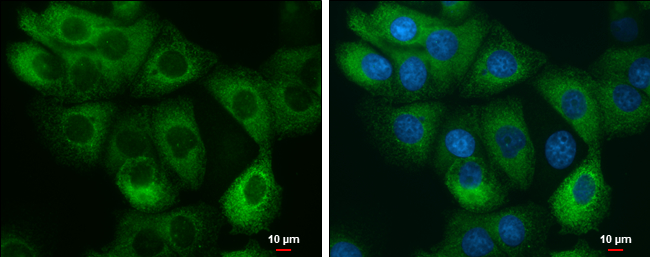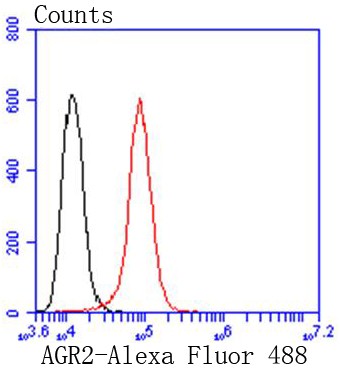![Anterior Gradient 2 antibody [HL1024] detects Anterior Gradient 2 protein at cytoplasm by immunofluorescent analysis. Sample: MCF-7 cells were fixed in ice-cold MeOH for 5 min. Green: Anterior Gradient 2 stained by Anterior Gradient 2 antibody [HL1024] (GTX635838) diluted at 1:500. Blue: Fluoroshield with DAPI (GTX30920). Anterior Gradient 2 antibody [HL1024] detects Anterior Gradient 2 protein at cytoplasm by immunofluorescent analysis. Sample: MCF-7 cells were fixed in ice-cold MeOH for 5 min. Green: Anterior Gradient 2 stained by Anterior Gradient 2 antibody [HL1024] (GTX635838) diluted at 1:500. Blue: Fluoroshield with DAPI (GTX30920).](https://www.genetex.com/upload/website/prouct_img/normal/GTX635838/GTX635838_44312_20220708_ICC_IF_22071401_665.webp)
Anterior Gradient 2 antibody [HL1024] detects Anterior Gradient 2 protein at cytoplasm by immunofluorescent analysis. Sample: MCF-7 cells were fixed in ice-cold MeOH for 5 min. Green: Anterior Gradient 2 stained by Anterior Gradient 2 antibody [HL1024] (GTX635838) diluted at 1:500. Blue: Fluoroshield with DAPI (GTX30920).
Anterior Gradient 2 antibody [HL1024]
GTX635838
ApplicationsImmunoFluorescence, Western Blot, ImmunoCytoChemistry, ImmunoHistoChemistry, ImmunoHistoChemistry Paraffin
Product group Antibodies
ReactivityHuman, Mouse, Rat
TargetAGR2
Overview
- SupplierGeneTex
- Product NameAnterior Gradient 2 antibody [HL1024]
- Delivery Days Customer9
- Application Supplier NoteWB: 1:500-1:3000. *Optimal dilutions/concentrations should be determined by the researcher.Not tested in other applications.
- ApplicationsImmunoFluorescence, Western Blot, ImmunoCytoChemistry, ImmunoHistoChemistry, ImmunoHistoChemistry Paraffin
- CertificationResearch Use Only
- ClonalityMonoclonal
- Clone IDHL1024
- Concentration1 mg/ml
- ConjugateUnconjugated
- Gene ID10551
- Target nameAGR2
- Target descriptionanterior gradient 2, protein disulphide isomerase family member
- Target synonymsAG-2, AG2, GOB-4, HAG-2, HEL-S-116, HPC8, PDIA17, RIFTD, XAG-2, anterior gradient protein 2 homolog, anterior gradient homolog 2, epididymis secretory protein Li 116, protein disulfide isomerase family A, member 17, secreted cement gland homolog, secreted cement gland protein XAG-2 homolog
- HostRabbit
- IsotypeIgG
- Protein IDO95994
- Protein NameAnterior gradient protein 2 homolog
- Scientific DescriptionThis gene encodes a member of the disulfide isomerase (PDI) family of endoplasmic reticulum (ER) proteins that catalyze protein folding and thiol-disulfide interchange reactions. The encoded protein has an N-terminal ER-signal sequence, a catalytically active thioredoxin domain, and a C-terminal ER-retention sequence. This protein plays a role in cell migration, cellular transformation and metastasis and is as a p53 inhibitor. As an ER-localized molecular chaperone, it plays a role in the folding, trafficking, and assembly of cysteine-rich transmembrane receptors and the cysteine-rich intestinal gylcoprotein mucin. This gene has been implicated in inflammatory bowel disease and cancer progression. [provided by RefSeq, Mar 2017]
- ReactivityHuman, Mouse, Rat
- Storage Instruction-20°C or -80°C,2°C to 8°C
- UNSPSC12352203

![Anterior Gradient 2 antibody [HL1024] detects Anterior Gradient 2 protein by immunohistochemical analysis. Sample: Paraffin-embedded mouse tissue. Anterior Gradient 2 stained by Anterior Gradient 2 antibody [HL1024] (GTX635838) diluted at 1:100. Antigen Retrieval: Citrate buffer, pH 6.0, 15 min Anterior Gradient 2 antibody [HL1024] detects Anterior Gradient 2 protein by immunohistochemical analysis. Sample: Paraffin-embedded mouse tissue. Anterior Gradient 2 stained by Anterior Gradient 2 antibody [HL1024] (GTX635838) diluted at 1:100. Antigen Retrieval: Citrate buffer, pH 6.0, 15 min](https://www.genetex.com/upload/website/prouct_img/normal/GTX635838/GTX635838_44312_20230106_IHC-P_multiple_M_23010400_776.webp)
![Various whole cell extracts (30 μg) were separated by 15% SDS-PAGE, and the membrane was blotted with Anterior Gradient 2 antibody [HL1024] (GTX635838) diluted at 1:1000. The HRP-conjugated anti-rabbit IgG antibody (GTX213110-01) was used to detect the primary antibody. Various whole cell extracts (30 μg) were separated by 15% SDS-PAGE, and the membrane was blotted with Anterior Gradient 2 antibody [HL1024] (GTX635838) diluted at 1:1000. The HRP-conjugated anti-rabbit IgG antibody (GTX213110-01) was used to detect the primary antibody.](https://www.genetex.com/upload/website/prouct_img/normal/GTX635838/GTX635838_44312_20210806_WB_TPM_watermark_w_23061202_311.webp)
![Rat tissue extract (50 μg) was separated by 15% SDS-PAGE, and the membrane was blotted with Anterior Gradient 2 antibody [HL1024] (GTX635838) diluted at 1:1000. The HRP-conjugated anti-rabbit IgG antibody (GTX213110-01) was used to detect the primary antibody. Rat tissue extract (50 μg) was separated by 15% SDS-PAGE, and the membrane was blotted with Anterior Gradient 2 antibody [HL1024] (GTX635838) diluted at 1:1000. The HRP-conjugated anti-rabbit IgG antibody (GTX213110-01) was used to detect the primary antibody.](https://www.genetex.com/upload/website/prouct_img/normal/GTX635838/GTX635838_44312_20210910_WB_R_colon_w_23061202_718.webp)



![Anterior Gradient 2 antibody [GT5812] detects secreted Anterior Gradient 2 protein by immunohistochemical analysis. Sample: Paraffin-embedded human breast carcinoma. Anterior Gradient 2 stained by Anterior Gradient 2 antibody [GT5812] (GTX634163) diluted at 1:200.
Antigen Retrieval: Citrate buffer, pH 6.0, 15 min](https://www.genetex.com/upload/website/prouct_img/normal/GTX634163/GTX634163_42849_20180504_IHC-P_w_23061202_607.webp)

